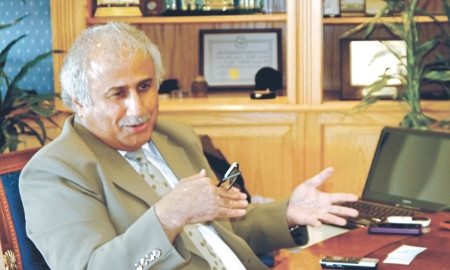A university degree is considered necessary among Kuwaitis, as public sector employees – who make up 90% of the total population – are required to hold a one. Kuwait University provides the nation with quality education and supplies the workforce with graduates who hold degrees recognized in the region for their underlying excellence.
“A lot of people in Kuwait are graduates of the university. You would also find several of our alumni in the other areas of the Gulf. Others are even in the U.S. In fact, some of the professors in certain American universities are graduates of KU,” says Professor Abdullatif Al-Bader, President of Kuwait University.
Established in 1966, just five years after the country’s independence from Great Britain, KU’s student body comprises more than 32,000 students distributed among the school’s 16 colleges of Law, Arts, Science, Medicine, Engineering and Petroleum, Allied Health Science, Education, Sharia and Islamic Studies, Business Administration, Pharmacy, Dentistry, Social Sciences, Women, Graduate Studies, Architecture, and Computer Science and Engineering.
A strong focus on research has long been a hallmark of KU, especially in fields relevant to Kuwait’s economy, such as engineering, petroleum, mining and medicine. The university has at students’ and faculty’s disposal an arsenal of exceptional resources, e-systems and state-of-the-art technologies.
KU recently signed a Research Support Agreement with AstraZeneca, the global biopharmaceutical company, to initiate the Gulf COAST Registry Project, a joint partnership venture in the sphere of cardiovascular research. A visiting delegation from the Center of Arab Genomics Studies in the UAE has also shown interest in collaborating with KU, in the realm of genomics, biomedical and health research.
Meanwhile, KU continues to strengthen local capacity in the oil and gas sector with the January 2012 signing of a sponsorship agreement to establish a new professional chair with Shell. Dubbed “Shell Natural Gas Chair”, it will focus on the development of an advanced research, teaching and knowledge-sharing program for the efficient and safe management of the country’s natural gas fields.
At the signing ceremony, Professor Abdullatif Al-Bader said, “I anticipate a new generation of Kuwaiti engineers, nurtured in a scientific environment, developing specialized skills in the field of natural gas, and assuming key roles in developing and advancing the local gas industry, which is a vital energy resource for the state of Kuwait. With ‘Shell Natural Gas Chair’, we take our first step in this direction.”
“The quality of the Kuwaiti students who are educated in the university can only be improved by giving the institution a more global dimension.“
Professor Abdullatif Al-Bader, President of Kuwait University
|
This partnership, which follows on the heels of KU’s creation of a Postdoctoral Fellowship and a Research Chair – which both open new employment channels in faculty research – is also representative of the move towards greater internationalization that the university’s president would like to see among its student population.
“The quality of the Kuwaiti students who are educated in the university can only be improved by giving the institution a more global dimension,” he says.
“We are shooting for more than just knowledge. We want to give our students a more holistic view of the world, such that when somebody from another background says something, they would understand where that person is coming from.”
He believes that by revitalizing KU’s graduate programs, the school could not only raise graduate student enrolment (it currently stands at just 1,100 as opposed to the 32,800 undergraduate students) but also attract more top students from around the world and offer them scholarships.
“We want to have students from different cultures to introduce different perspectives and ideas to our local students. Our professors can also benefit from getting the top students from all over the world. It means that when they do research, they are being assisted by the best that the world could offer, with a true interest in the field. This means that we get motivated, hard-working individuals who can produce substantial results. It is a mutually beneficial relationship,” says Professor Al-Bader.
“To offer these top international students scholarships and grants is a sure way to get a return on investment. This means we get people of quality assisting the professors in teaching the younger students. When these students finish and go back home, they become our ambassadors for life,” he adds.
KU currently has graduate university exchange agreements with 54 universities throughout the U.S. and Canada, including Arizona State University, Purdue University, Monterey Institute of International Studies, University of Oregon, Texas A&M, and the George Washington University schools of Business and Engineering & Applied Sciences.

0 COMMENTS